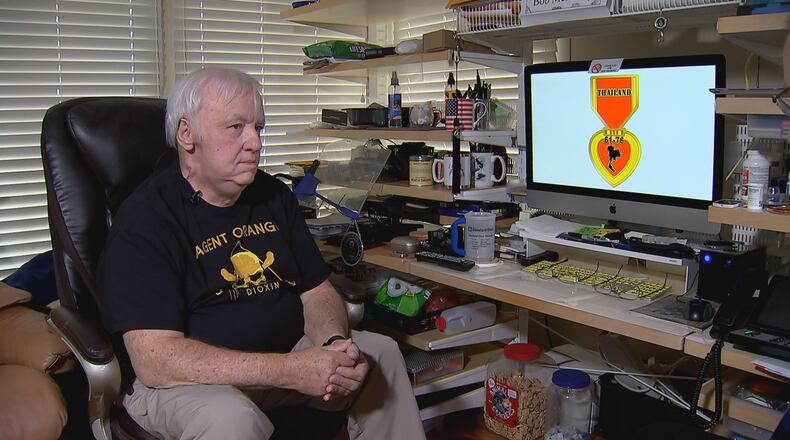Those who served “in-country” in Vietnam enjoy a nearly automatic VA presumption that they were exposed to these herbicides, sometimes popularly called “Agent Orange.”
Those who served in Thailand are offered no such presumption. Thailand veterans have to make their case to the VA — and they say that case can be difficult to make sometimes.
“We’re the stepchildren of the Vietnam War because we weren’t in country in the Vietnam War,” said Bob McHenry, 72, of Centerville, who as an airman worked in aircraft maintenance on a U.S. base in Thailand from December 1973 to December 1974.
Thailand veteran Paul Skinner, 65, has a disability claim into the VA for illnesses related to what he says was exposure to toxic herbicides and other chemicals.
“They sprayed it everywhere,” Skinner, a Xenia resident, said of the chemicals. “But they say, if you weren’t on a (base) perimeter, you weren’t exposed. Well, our barracks were along the perimeter.”
“For any veteran who served in Vietnam, who set foot on Vietnam, they are presumed to have been exposed to Agent Orange,” said attorney Robert Chisholm, a partner in a Providence, R.I. law firm, Chisholm Chisholm & Kilpatrick, a firm that assists veterans with these cases nationally. “They don’t have to prove that element of the claim. If they have certain diseases, those diseases are presumed to have been a result of that exposure to Agent Orange.”
“It’s a money thing,” Skinner argued. “They know it’s going to cost millions of dollars.”
“Until you find a (budgetary) offset, don’t bother to call us,” McHenry says a VA representative has told him and his compatriots.
“It’s a policy decision by Congress, frankly,” Chisholm said. “To me, it’s about the money. It’s too costly.”
The herbicide and the personnel were both in Thailand at the same time, and the veterans say the wind-borne chemicals did not respect fence-lines.
At the height of the war, some 50,000 American military personnel were stationed in Thailand. The herbicides were used as a defoliant — to kill plants and vegetation at the perimeter or fence-line of U.S. bases so that base personnel could see anyone approaching that fence-line.
Exposure to these chemicals has been linked to types of leukemia, Hodgkin’s disease, multiple myeloma and other conditions.
Skinner said he is dealing with prostrate cancer, and he attributes that to defoliant exposure. McHenry is also battling cancer, but he said he has received benefits. He said he remains vocal on the issue for his fellow veterans who have not yet won benefits.
Veterans affected by the chemicals may pursue health or disability benefits — or both, said Rose Burberry-Martin, a spokeswoman for law firm Chisholm Chisholm & Kilpatrick.
“It really depends on the case,” she said. “The reasons for pursuing service connection and service-connected disability compensation may vary from access to health care to recognition and acknowledgement from VA that their military service caused their current medical conditions.”
A VA spokeswoman says the department strives to help Thailand veterans from that era. But that distinction between those who served in Thailand and those who served in Vietnam is anchored in law.
“A presumption of service connection for Agent Orange-related conditions does not exist in law or regulation for veterans who served in Thailand,” Susan Carter, director of the VA office of media relations, said in an email to the Dayton Daily News. “However, VA may grant service connection on a direct basis for Agent Orange-related conditions if a veteran served in Thailand during the Vietnam era and VA determines that the veteran was exposed to Agent Orange.
“VA considers these claims on a case by case basis,” she added.
In situations where a veteran needs help substantiating a claim of exposure, the department can assist, Carter also said. That assistance can include medical examinations or securing records.
Congress passed and President Trump signed into law the “Bluewater Vietnam Veterans Act” this year, covering disability claims for U.S. Navy sailors exposed to the herbicides. The VA has said such claims will begin to be awarded starting Jan. 1.
But legislation has been introduced by senators John Boozman, R-Ark., and Joe Donnelly, D-Ind., to cover veterans who served in Thailand — and that bill appears to have stalled.
U.S. Rep. Mike Turner, R-Dayton, has expressed support for the legislation. However, Ohio veterans say senators Sherrod Brown and Rob Portman have not signed on.
Skinner said he reached out to Brown’s office for assistance and received an email Oct. 24 that references “burn pits” (and Brown’s support for the “Burn Pit Accountability Act,”) which was an issue tied to another war, relevant to veterans who served in Iraq.
Skinner didn’t feel the email was responsive to his situation. “The burn pits were a different war, Iraq and Afghanistan,” he said. “I mean, this is the kind of silliness that we’re getting.”
A representative of Brown’s office this week said the office has reached out to Skinner. “Our office has told him we’ll keep him updated after we thoroughly review the legislation,” she said.
The office also pointed that that earlier this month, Brown took to the Senate floor and urged Trump to expand the VA’s official list of medical conditions associated with exposure to Agent Orange to include parkinsonism, bladder cancer, hypertension and hypothyroidism.
Portman’s office said it is evaluating the Boozman-Donnelly legislation.
About the Author


